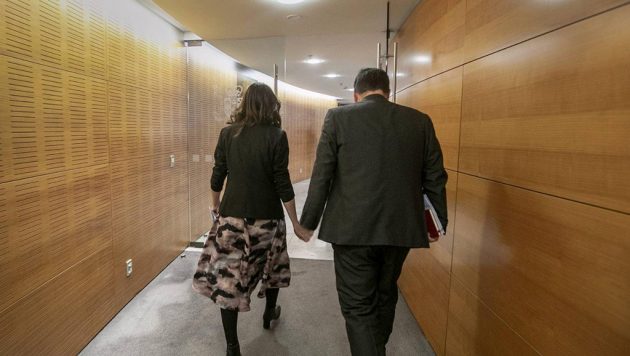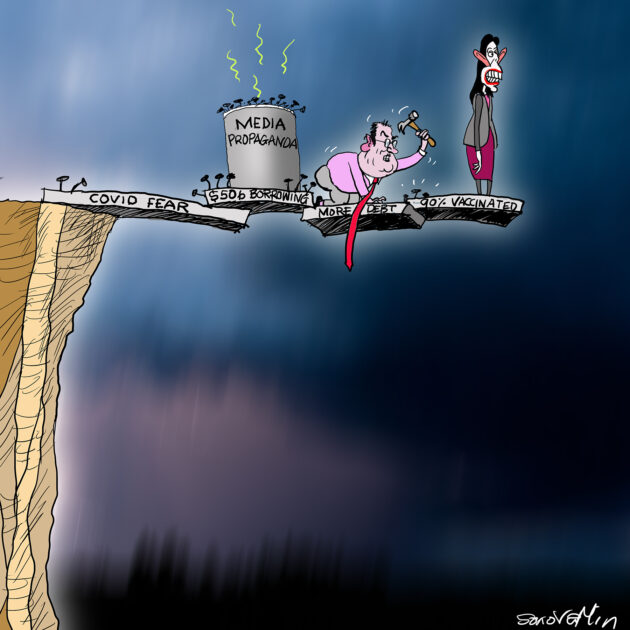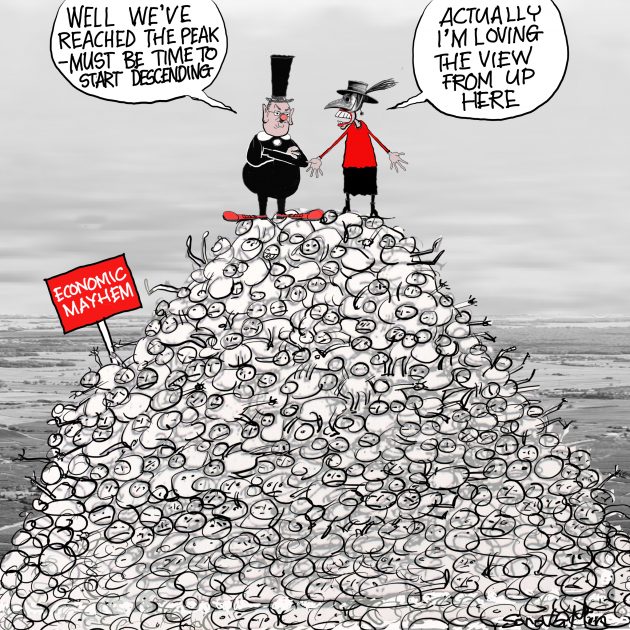Bryce Edwards
Victoria University Of Wellington – Te Herenga Waka
democracyproject.nz
Dr Bryce Edwards is Political Analyst in Residence at Victoria University of Wellington. He is the director of the Democracy Project.
The dream run of Jacinda Ardern’s Labour Government’s seems well and truly over. The highs of last year’s historic election result and the ongoing triumph of beating Covid have quickly evaporated. This is not just apparent from the last two months of disappointing Covid management, but also from the weekend’s annual party conference, which failed to reset and inject dynamism back into Labour.
Conferences are meant to be forums for debate, vibrancy, renewal, and recalibration. But Labour’s conference this year was none of these things: it was a damp squib. You’ll search in vain to find much positive commentary or excitement coming out of it. Those that observed the party over the weekend were universally underwhelmed.
Of course, part of the reason for this was Covid. The party decided not to have an in-person conference and instead do it all online in a highly truncated and virtual way. This meant it was barely a conference at all – and more of a minor membership meeting and a chance for yet another Jacinda Ardern livestream.
Ardern’s “unspectacular” speech
The Prime Minister’s conference speech was summed up as “boring” by one political editor. Another correspondent said the mood of the whole event as “solemn, sober, utterly unspectacular”. Writing for the Spinoff, Toby Manhire says Ardern’s “conference speech was competent, forgettable, underwhelming; it was a long way from the kind of extravaganza Labour might have imagined at this time last year” – see: The very unspectacular Jacinda Ardern.
But could it be that a boring speech and conference is exactly what Labour had wanted? That’s the suggestion of today’s Otago Daily Times editorial, which argues: “Labour might have welcomed the lower level of scrutiny than usual though, as last week’s untidiness simply continued what has been a messy few weeks for the Government” – see: Labour’s low-key conference.
Today the newspaper warns that “the lustre of Labour’s biggest asset, Ms Ardern, seems to be waning”, but the conference needed to do more work to revitalise:
“with Labour seemingly stalled in an end of year fug, Ms Ardern arguably needed to do more to re-energise both her party and the country as a whole.” They also warn that Labour would be wise not to just dismiss the increasing protests against Ardern: “if it does so it may well be missing a more widespread and potentially politically damaging malaise.”
The underwhelming policy announcement on family payments
The quickly increasing wealth inequality and poverty that has occurred under Labour continues to demand attention, and at the conference Ardern obviously hoped to impress with the “major” announcement in her speech that Working for Families and Best Start baby payments would be increased. But once the hype and spin are removed from the equation, the amount of increased payment is only about $5 a week.
This was derided by anti-poverty advocates and political commentators alike. Herald political editor Claire Trevett labelled it “underwhelming” and pointed out that most of the increase “was simply inflation adjustment for the past four years”.
She put the increase in context:
“That is small change compared to the $5.3 billion that has gone into business support and wage subsidies during the three months of the Delta outbreak. It will not be a game changer for child poverty”
– see: Labour conference tonic for Ardern, but Covid still gatecrashes the party (paywalled).
The Child Poverty Action Group has been particularly scathing about a policy that Ardern says is designed to decrease child poverty. An organisation’s spokesperson Janet McAllister argued that the miserly increase shows that the Government is “out of touch” with what is needed right now. She says:
“Low-income children and their families are in real distress right now, and food banks are overwhelmed. Families needed a very significant payment well before now, let alone April next year”.
Once more, it seems that children of parents on benefits miss out from policies designed to direct money more to working families.
What’s more, even the coalition partner the Greens spoke out, with spokesperson Ricardo Menéndez March dismissing the policy as mere “window dressing”.
Labour leadership change coming?
The only key decision made in the weekend was to take away some of the power that party members and unions have to elect the party leader. Whereas for the last decade the leader is supposed to be elected by a vote of the whole party, now the caucus will get to decide by themselves if they can come to a two-thirds consensus in the first week after a vacancy is to be filled.
This centralisation of power has obviously disappointed some members and commentators who see this as less democratic, but it certainly makes leadership changes potentially much smoother for the party.
One political journalist has dubbed the new mechanism “the Robbo Rule” – because it clears the way for Grant Robertson to be anointed as prime minister when Ardern steps down. As Claire Trevett writes:
“It is designed in case Ardern decides to leave while still Prime Minister: to allow a speedy handover to another leader (yes, Grant Robertson, although he was less than keen to talk about what the change in rules might mean).”
The speculation about Ardern stepping down just continues to step up – with a lot of talk in the media and political circles that Ardern is likely to resign before the end of the parliamentary term. In the weekend, Ardern gave various interviews in which she denied having plans to leave anytime soon. But, of course, she used careful wording that avoided making any commitments to lead Labour into the next election. She’s left her options open in a way that will keep the eye on Robertson as a potential new prime minister.

One-year mark in Government
The conference also occurred at about the one-year mark of the new second-term administration, which meant that there has been much reflection lately on the achievements, or lack thereof, from Ardern’s new government.
Political observers have grown very unimpressed with the Government’s competency. For instance, Andrea Vance wrote yesterday that the Government’s management of Covid seems to be shambolic and incompetent, and dismisses the bog-standard defence that we should just be happy that we haven’t died from Covid. She argued that we should expect more from our governments than this – see: Keeping people alive is the bare minimum a Government should do.
In the weekend, the Herald’s Audrey Young provided her usual six-monthly school report style marking of the Government. In this she registers downgrades for the performance of both Ardern and the Covid minister Chris Hipkins – they both drop from 8/10 to just 7/10. On the PM, Young says:
“Ardern’s crown for gold-standard communications has slipped in the past six weeks. Some of her press conferences led to greater confusion than clarification”.
Other senior Cabinet colleagues are downgraded. Megan Woods goes down from 7 to 6 and is labelled as “underworked”. Poto Williams goes down from 6 to 4 having “made no impact in either Police or Building and Construction – and has done nothing to justify her ranking as No 10 in the Cabinet. Law and order has become a weak point for the Government.”
Kris Faafoi goes down from 7 to 5:
“Has gone from a star performer in the first term to a bit of a worry in the second term, particularly in Immigration where responses to Covid have been painfully slow. Has seen Covid as an opportunity for slow major reform instead of urgent crisis response.”
However, 9/10 marks are awarded to Robertson, Damien O’Connor and Carmel Sepuloni. You can see the full report here: Rating Jacinda Ardern’s second-term cabinet after first anniversary (paywalled).
Finally, for one of the very best analyses around of what is currently bedevilling the Government, see Graham Adams’ excellent long-form essay: Jacinda Ardern and the Ghost of David Lange.
This article can be republished under a Creative Commons CC BY-ND 4.0 license. Attributions should include a link to the Democracy Project.
Please share this article so that others can discover The BFD.



